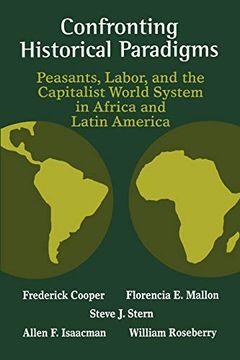Compartir
Confronting Historical Paradigms: Peasants, Labor, and the Capitalist World System in Africa and Latin America (en Inglés)
Frederick Cooper (Autor)
·
University Of Wisconsin Press
· Tapa Blanda
Confronting Historical Paradigms: Peasants, Labor, and the Capitalist World System in Africa and Latin America (en Inglés) - Frederick Cooper
$ 47.770
$ 79.610
Ahorras: $ 31.840
Elige la lista en la que quieres agregar tu producto o crea una nueva lista
✓ Producto agregado correctamente a la lista de deseos.
Ir a Mis Listas
Origen: Estados Unidos
(Costos de importación incluídos en el precio)
Se enviará desde nuestra bodega entre el
Martes 14 de Mayo y el
Jueves 23 de Mayo.
Lo recibirás en cualquier lugar de Chile entre 1 y 3 días hábiles luego del envío.
Reseña del libro "Confronting Historical Paradigms: Peasants, Labor, and the Capitalist World System in Africa and Latin America (en Inglés)"
Confronting Historical Paradigms argues that confrontation with major paradigms of world history has marked the fields of African and Latin American history during the last quarter-century, and that the process has dramatically restructured historical and theoretical understanding of peasantries, labor, and the capitalist world system. Moreover, it maintains, the intellectual reverberations within and across the African and Latin American fields constitute a challenging and underappreciated counterpoint to laments that contemporary historical knowledge has suffered a splintering so extreme that it undermines larger dialogue and meaning. The authors, in their substantive essays, synthesize, order, and evaluate the significance of the enormous resonating literatures that have come to exist for Africa and Latin America on the themes of the capitalist world system, labor, and peasantries. They historicize these literatures by analyzing an entire cycle of critical dialogue and confrontation with historical paradigms and the professional upheavals that accompanied them. They review the initial confrontations with frameworks of historical knowledge that erupted in the 1960s and the early 1970s; the emergence of new "dissident" paradigms; the outpouring of subsequent scholarship on peasants, labor, and capitalism that began to unravel the newly proposed paradigms by the 1980s and 1990s; and the outlines of the new interpretive frameworks that tended to displace both the "traditional" and "early dissident" paradigms. They also suggest possible outlines of a new cycle of "Third World" confrontations with paradigm, anchored in themes such as gender and ethnicity. Confronting Historical Paradigms employs a historicized awareness of intellectual networks, conversations, and history-theory dialogues. The result is a critical analysis and synthetic presentation of substantive advances that have preoccupied scholarship on Africa and Latin America in recent decades and a powerful challenge to notions that "new" fields of history have ended up destroying intellectual coherence and community.

